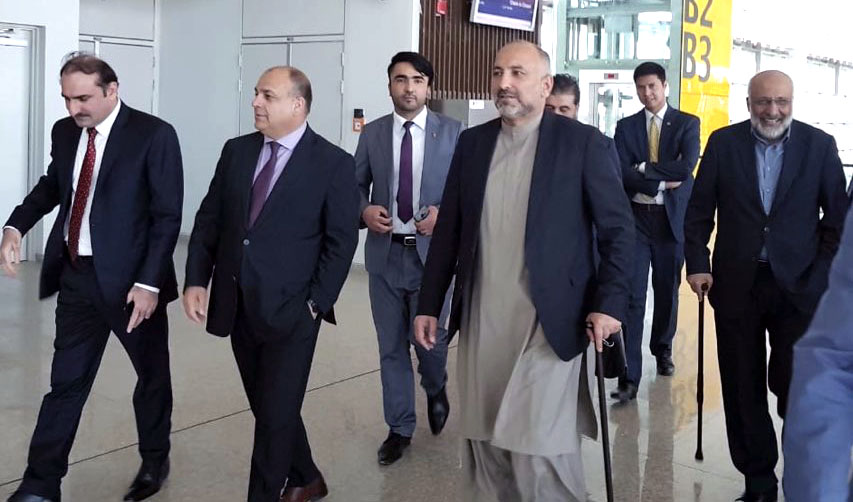ISLAMABAD: Pakistan and Afghanistan on Sunday agreed to implement the key principles of a new bilateral dialogue mechanism which says both sides will “undertake effective actions against fugitives and the irreconcilable elements posing security threats to either of the two countries.”
Afghanistan has long accused Pakistan of “sheltering” Taliban leaders, a charge Islamabad denies. On their part, Pakistani officials insist that Pakistani armed groups now operate from the ungoverned areas on the Afghan side of the border.
After a series of discussions both countries agreed this month to operationalize the Afghanistan Pakistan Action Plan for Peace and Solidarity (APAPPS), which provides a framework to deepen interaction in all spheres of bilateral engagements.
Afghan National Security Adviser Haneef Atmar led a high-level delegation comprising intelligence chief Masum Stanekzai, Interior Minister Wais Barmak and Afghan ambassador to Pakistan Omar Zakhilwal in talks with Pakistani officials in Islamabad.
National Security Adviser Lt. General (Retd) Nasser Khan Janjua led the Pakistani side and both countries “reiterated to work closely on sincere implementation of APPAPS to seek peace which is so essential for the suffering people of both the countries.”
Both sides established that peace was their common and biggest need that can come through the implementation of APAPPS, which has the potential to bridge the gaps of the past and also makes the bridges for the future, the NSA office said.

Afghanistan top security adviser Haneef Atmar, third from the left, arrives in Islamabad for talks with Pakistani officials on security officials on May 27, 2018. (Photo courtesy: Afghan DCM/Twitter)
Five working groups have been operationalized for meaningful engagement: the Politico-Diplomatic Working Group, the Economic Working Group, the Refugee Working Group, Military to Military Coordination and Intelligence Cooperation.
Experts in Pakistan and Afghanistan seem upbeat at the launch of the new bilateral mechanism and both sides are now looking into the issues that have been the main concern of both countries.
Former Afghan deputy trade minister, Muzammil Shinwari, described the APAPPS as “quite important” for both countries as it focuses on areas that are relevant to both countries and it can solve many problems that arise between them.
“The first important point is that Pakistan and Afghanistan have agreed that both countries should not let their soil to be utilized by the insurgents in order to harm the other country. The other key point is an end to the blame game. I think these two points are creating most of the problems but if they are agreed on this. I think the other issues will be automatically resolved and addressed,” Shinwari, who also heads a track-II group with a Pakistani institute, told Arab News from Kabul.
He said APAPPS has also paved the way for a trade officials meeting in Islamabad that led to an agreement to resolve some issues in bilateral trade and transit.
Imtiaz Gul, director of an Islamabad-based research group, says that APAPPS is significantly important because after more than 17 years, both countries have agreed to engage in a structured dialogue, particularly after long reluctance by the Afghans to hold talks at all.
“Now APAPPS not only provides a joint mechanism for pursuing all issues but also commits both countries to refrain from public blame games, and take demonstrable action against all those elements that threaten the respective country,” Gul, executive director of the Center for Research and Security Studies told Arab News.


























